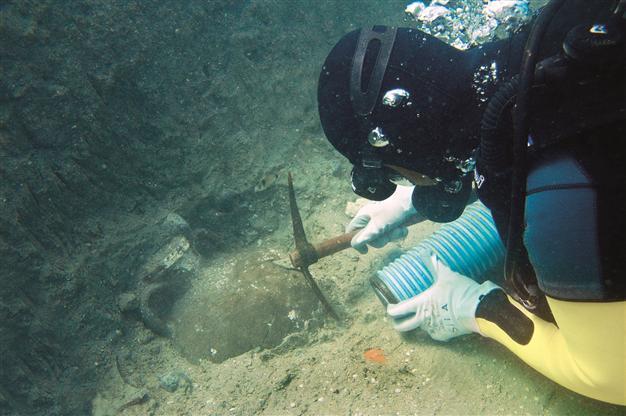Millennia-old sunken ship could be world’s oldest, researchers suggest
İZMİR – Anadolu Agency
 Underwater excavations led by Ankara University’s Research Center for Maritime Archaeology (ANKÜSAM) have uncovered sunken ships ranging from the second century B.C. to the Ottoman period in İzmir’s Urla district.
Underwater excavations led by Ankara University’s Research Center for Maritime Archaeology (ANKÜSAM) have uncovered sunken ships ranging from the second century B.C. to the Ottoman period in İzmir’s Urla district.A recent excavation uncovered a ship estimated to date back 4,000 years, which experts say would make it the oldest sunken ship to have been discovered in the Mediterranean.

Resim alt yazısı burada olmalı.
Uzun olanlar satır ile
bölünmeli. İçindeki nesnelere
göre genişlik otomatik olur.
He said the team is currently working to determine the features and correct age of its most recent shipwreck find.
There are two other sunken boats that compete for the title of the world’s oldest, Erkanal said. The Uluburun shipwreck, found off the coast of Kaş, is around 3,500 years old, while the sunken ship of Hatshepsut, the fifth pharaoh of Ancient Egypt’s 18th dynasty, is dated to be around 150 years older.
“If we confirm that the sunken ship [we have found] is 4,000 years old, it will be a very important milestone for archaeology,” Erkanal said.
 Erkanal said materials removed from seawater must be cleaned of salt to
prevent further decay. This process is conducted in a large restoration
and conservation laboratory at the recently opened Mustafa Vehbi Koç
Maritime Archaeology Research Center and Archaeopark. The process of
removing a sunken ship from the water can take approximately seven to
eight years, Erkanal said.
Erkanal said materials removed from seawater must be cleaned of salt to
prevent further decay. This process is conducted in a large restoration
and conservation laboratory at the recently opened Mustafa Vehbi Koç
Maritime Archaeology Research Center and Archaeopark. The process of
removing a sunken ship from the water can take approximately seven to
eight years, Erkanal said. Erkanal said that through its discoveries, the team is working to make the sea map of the region. “We’re also working on a project to turn the region, which has a lot of important [information] for world maritime history, into an experimental archaeology center,” he said.
The team will also focus on removing and displaying an Ottoman ship from the site, planning to begin work in the next year. Citing only a few other Ottoman-era shipwrecks that have been discovered in Limantepe, Erkanal said there is a “significant deficiency” in the archaeological record.
“It is unfortunate that we don’t have even one example to show our sea forces that ruled the Mediterranean in the past,” he said.
















